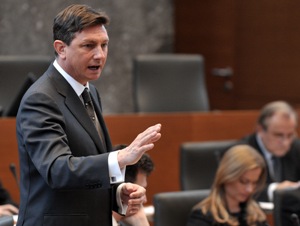NEWS
Prime Minister Pahor at the extraordinary session of the National Assembly: on 6 June, we will decide for the future or for the past
"No new circumstances have arisen and all matters have been clarified on several occasions, but a decision which the citizens will make on 6 June is so important that no discussion in the National Assembly is redundant, even if certain matters are repeated," said the Prime Minister of the Republic of Slovenia, Borut Pahor, with reference to the allegations of the opposition, in his address to the deputies at the extraordinary session of the National Assembly and added: "The Arbitration Agreement, which was signed with Croatian Prime Minister Kosor and subsequently ratified by this National Assembly and which will, hopefully, be endorsed by the majority vote at the referendum, is the only instrument defining the tasks of the Arbitral Tribunal; there is no other unilateral statement defining them. There is not a shred of doubt about that."
(Photo: Tamino Petelinšek/STA)
Prime Minister Pahor continued by telling the deputies that Slovenia and Croatia had never jointly informed any witnesses about a harmonised statement; this had already been formally confirmed by one of the witnesses. Information that Slovenia and Croatia had jointly informed the Swedish Presidency of the EU and the Government of the United States of America about their mutual consent on the unilateral Croatian statement was denied yesterday by the Swedish Ambassador to Slovenia, Inger Ultvedt, who also explained that Sweden had been informed about the Croatian intent to submit the unilateral statement and its wish that Sweden would act as a kind of witness, but Sweden had rejected that and had never been informed about any joint statement.
"Nobody knows exactly how the Tribunal will rule; we only know one thing, which is that Slovenia will have junction to the High Sea because this is requested from the Arbitral Tribunal. At the referendum, Slovenia has an opportunity to decide in favour of the Arbitration Agreement and the future with a fair border and settled relationship with its neighbour or choose the past with no formally regulated border, in particular the maritime border, where incidents and conflicts would occur. The people will choose between the future and the past," added Prime Minister Pahor and continued by underlining that those opposing the Arbitration Agreement must indicate the alternative or tell what the future holds for us. He added: "In connection with such an important issue, we are probably entitled to know what the Slovene politics will do if the Arbitration Agreement is rejected, given the fact that in 18 years we have not been able to reach any other agreement, and if the chances of adopting such an agreement in a very short time are meagre."
At the close of his address, Prime Minister Pahor repeated that the arguments stated by the opposition as hidden, covered or misleading reasons and allegedly in contravention of national interests were ruled out not only by the Slovenian Government but also by representatives of the Governments witnessing the process. "The Slovenian Government led the negotiations bearing in mind and following a key aspiration, i.e., a just solution to the border issue, found in mutual interest with the Republic of Croatia, because no coerced border would offer a permanent and just solution and we have achieved this with great difficulty and devoting this issue considerable time," added Prime Minister Pahor.




